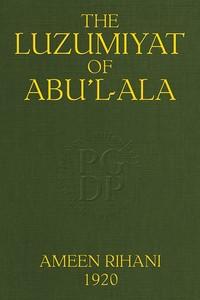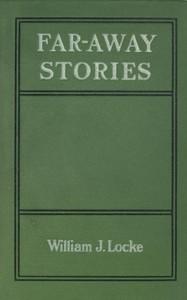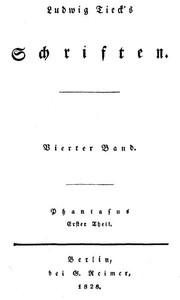Read this ebook for free! No credit card needed, absolutely nothing to pay.
Words: 91197 in 36 pages
This is an ebook sharing website. You can read the uploaded ebooks for free here. No credit cards needed, nothing to pay. If you want to own a digital copy of the ebook, or want to read offline with your favorite ebook-reader, then you can choose to buy and download the ebook.
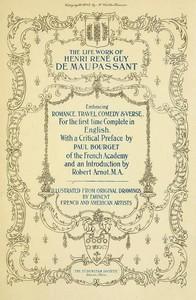

: Notre Coeur; or A Woman's Pastime: A Novel by Maupassant Guy De - France Fiction; Man-woman relationships Fiction; Love Fiction
GUY DE MAUPASSANT - Critical Preface: Paul Bourget INTRODUCTION - Robert Arnot, M. A.
NOTRE COEUR
ADDENDA
THE OLIVE GROVE REVENGE AN OLD MAID COMPLICATION FORGIVENESS THE WHITE WOLF
HENRI RENE GUY DE MAUPASSANT "THEY WERE ALONE ... SHE WAS WEEPING"
GUY DE MAUPASSANT
Of the French writers of romance of the latter part of the nineteenth century no one made a reputation as quickly as did Guy de Maupassant. Not one has preserved that reputation with more ease, not only during life, but in death. None so completely hides his personality in his glory. In an epoch of the utmost publicity, in which the most insignificant deeds of a celebrated man are spied, recorded, and commented on, the author of "Boule de Suif," of "Pierre et Jean," of "Notre Coeur," found a way of effacing his personality in his work.
We know, too, that he passionately loved a strenuous physical life and long journeys, particularly long journeys upon the sea. He owned a little sailing yacht, named after one of his books, "Bel-Ami," in which he used to sojourn for weeks and months. These meager details are almost the only ones that have been gathered as food for the curiosity of the public.
I leave the legendary side, which is always in evidence in the case of a celebrated man,--that gossip, for example, which avers that Maupassant was a high liver and a worldling. The very number of his volumes is a protest to the contrary. One could not write so large a number of pages in so small a number of years without the virtue of industry, a virtue incompatible with habits of dissipation. This does not mean that the writer of these great romances had no love for pleasure and had not tasted the world, but that for him these were secondary things. The psychology of his work ought, then, to find an interpretation other than that afforded by wholly false or exaggerated anecdotes. I wish to indicate here how this work, illumined by the three or four positive data which I have given, appears to me to demand it.
And first, what does that anxiety to conceal his personality prove, carried as it was to such an extreme degree? The answer rises spontaneously in the minds of those who have studied closely the history of literature. The absolute silence about himself, preserved by one whose position among us was that of a Tourgenief, or of a M?rim?e, and of a Moli?re or a Shakespeare among the classic great, reveals, to a person of instinct, a nervous sensibility of extreme depth. There are many chances for an artist of his kind, however timid, or for one who has some grief, to show the depth of his emotion. To take up again only two of the names just cited, this was the case with the author of "Terres Vierges," and with the writer of "Colomba."
A somewhat minute analysis of the novels and romances of Maupassant would suffice to demonstrate, even if we did not know the nature of the incidents which prompted them, that he also suffered from an excess of nervous emotionalism. Nine times out of ten, what is the subject of these stories to which freedom of style gives the appearance of health? A tragic episode. I cite, at random, "Mademoiselle Fifi," "La Petite Roque," "Inutile Beaut?," "Le Masque," "Le Horla," "L'?preuve," "Le Champ d'Oliviers," among the novels, and among the romances, "Une Vie," "Pierre et Jean," "Fort comme la Mort," "Notre Coeur." His imagination aims to represent the human being as imprisoned in a situation at once insupportable and inevitable. The spell of this grief and trouble exerts such a power upon the writer that he ends stories commenced in pleasantry with some sinister drama. Let me instance "Saint-Antonin," "A Midnight Revel," "The Little Cask," and "Old Amable." You close the book at the end of these vigorous sketches, and feel how surely they point to constant suffering on the part of him who executed them.
This is the leading trait in the literary physiognomy of Maupassant, as it is the leading and most profound trait in the psychology of his work, viz., that human life is a snare laid by nature, where joy is always changed to misery, where noble words and the highest professions of faith serve the lowest plans and the most cruel egoism, where chagrin, crime, and folly are forever on hand to pursue implacably our hopes, nullify our virtues, and annihilate our wisdom. But this is not the whole.
Free books android app tbrJar TBR JAR Read Free books online gutenberg
More posts by @FreeBooks

: The Toxins and Venoms and Their Antibodies by Pozzi Escot M Emm Marius Emmanuel Cohn Alfred I Alfred Isaac Translator - Poisons; Toxins; Antitoxins; Venom Physiological effect
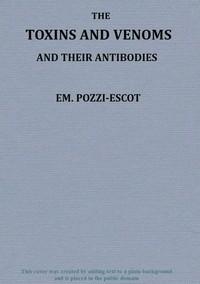

: The Luzumiyat of Abu'l-Ala Selected from his Luzum ma la Yalzam and Suct us-Zand by Abu Al Ala Al Maarri Rihani Ameen Fares Translator - Arabic poetry Translations into English
